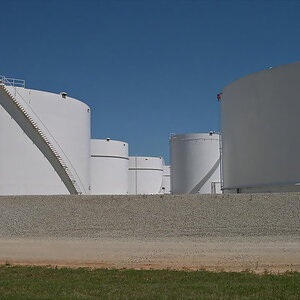Navigation
Install the app
How to install the app on iOS
Follow along with the video below to see how to install our site as a web app on your home screen.

Note: This feature currently requires accessing the site using the built-in Safari browser.
More options
You are using an out of date browser. It may not display this or other websites correctly.
You should upgrade or use an alternative browser.
You should upgrade or use an alternative browser.
Canon 70-200L IS USM vs 100-400 IS
- Thread starter Pauky
- Start date
steve817
TPF Noob!
I bought the 70-200. I needed the wider aperture and have no regrets.
MPowerM3
TPF Noob!
- Joined
- Mar 19, 2006
- Messages
- 239
- Reaction score
- 0
- Location
- Ct, USA
- Can others edit my Photos
- Photos OK to edit
What kind of camera is it for and what do you want to shoot?
Get the 2.8 for the fast action type shots, and use a teleconverter if you need even more reach. But the "IS" is very nice.
Remember on anything but the 5d, your really looking at 100mm-300mm effective zoom with the crop factor.
After 300mm or so your going to need a tripod or monopod for good shots above that.
Get the 2.8 for the fast action type shots, and use a teleconverter if you need even more reach. But the "IS" is very nice.
Remember on anything but the 5d, your really looking at 100mm-300mm effective zoom with the crop factor.
After 300mm or so your going to need a tripod or monopod for good shots above that.
soylentgreen
TPF Noob!
- Joined
- Feb 27, 2007
- Messages
- 735
- Reaction score
- 2
- Location
- Miami, FL
- Can others edit my Photos
- Photos NOT OK to edit
Luminous-landscape.com has a detail comparison of the two lenses you mentioned. You can find it under their reviews link if you search under canon.
I decided on getting the 100-400 since I wanted the extra zoom. Already have the f/4 70-200 but it loses sharpness with a Teleconverter. I was considering upgrading to the 70-200 f/2.8 IS as an alternative since it is sharper than the 100-400 and with the TC it will stop down to a 5.6. But with the TC and at comparable focal lengths, the 100-400 is actually sharper. I figured I would be shooting wide open most of the time anyway. Hope that helps.
I decided on getting the 100-400 since I wanted the extra zoom. Already have the f/4 70-200 but it loses sharpness with a Teleconverter. I was considering upgrading to the 70-200 f/2.8 IS as an alternative since it is sharper than the 100-400 and with the TC it will stop down to a 5.6. But with the TC and at comparable focal lengths, the 100-400 is actually sharper. I figured I would be shooting wide open most of the time anyway. Hope that helps.
Alex_B
No longer a newbie, moving up!
- Joined
- Aug 30, 2006
- Messages
- 14,491
- Reaction score
- 206
- Location
- Europe 67.51°N
- Can others edit my Photos
- Photos NOT OK to edit
remember, it is very hard to shoot with the 400mm handheld, even with IS. So if you hate tripods, buy the 70-200mm.
And as already has been said, on a crop camera think more of it as 200 x 1.6 which is 300ish.
And as already has been said, on a crop camera think more of it as 200 x 1.6 which is 300ish.
RacePhoto
Pete
- Joined
- Dec 29, 2006
- Messages
- 811
- Reaction score
- 93
- Location
- Wisconsin
- Website
- peteklinger.com
- Can others edit my Photos
- Photos NOT OK to edit
I
I bought the 70-200 and a 1.4 extender. (aka how to make a really good lens into a pretty good lens) Some days I wish I had the 100-400 instead. Other days, the 70-200 and the speed are just perfect. With the extender it's just fine.
Some days I wish I had the 100-400 instead. Other days, the 70-200 and the speed are just perfect. With the extender it's just fine.
Next on my list is the 300mm L f/4 prime. A real bargain lens and it takes me past the 200. I can throw the 1.4X on it and have 420. Hey look, everything from 70-420 covered now.
Don't be fooled by the field of view change, the 200 is still just a 200! It doesn't magically become a longer lens because you put it on a smaller sensor. You are just getting 62% of the full image, which makes it appear like the view you would get from a 320. You don't get more magnification.
You Don't Get More Zoom!
One lens test with the 300mm f/2.8 vs the 300mm f/4 showed that for film, there was a measurable difference in sharpness. For digital it would mean you needed to be shooting at 11mp or more to see that same difference. At 6-10mp you might find no noticeable difference.
Putting an extender on the lenses above slows down the autofocus. Which means the 100-400 by itself will focus faster than the 70-200 with an extender.
I bet I spent a month deciding between the two. Now that I did, I can answer your question. No matter which one you get, you will be happy!
If you want the lens speed, take the 2.8, if you want longer range, take the 100-400. What most of would like is the imaginary 100-400 L IS USM 2.8-3.5, for the same price... right? :lmao:
If you were going to spend the money, which would you buy and why?
EF 70-200mm f/2.8L IS USM or the EF 100-400mm f4.5-5.6 L IS USM
I bought the 70-200 and a 1.4 extender. (aka how to make a really good lens into a pretty good lens)
 Some days I wish I had the 100-400 instead. Other days, the 70-200 and the speed are just perfect. With the extender it's just fine.
Some days I wish I had the 100-400 instead. Other days, the 70-200 and the speed are just perfect. With the extender it's just fine.Next on my list is the 300mm L f/4 prime. A real bargain lens and it takes me past the 200. I can throw the 1.4X on it and have 420. Hey look, everything from 70-420 covered now.

Don't be fooled by the field of view change, the 200 is still just a 200! It doesn't magically become a longer lens because you put it on a smaller sensor. You are just getting 62% of the full image, which makes it appear like the view you would get from a 320. You don't get more magnification.
You Don't Get More Zoom!
One lens test with the 300mm f/2.8 vs the 300mm f/4 showed that for film, there was a measurable difference in sharpness. For digital it would mean you needed to be shooting at 11mp or more to see that same difference. At 6-10mp you might find no noticeable difference.
Putting an extender on the lenses above slows down the autofocus. Which means the 100-400 by itself will focus faster than the 70-200 with an extender.
I bet I spent a month deciding between the two. Now that I did, I can answer your question. No matter which one you get, you will be happy!
If you want the lens speed, take the 2.8, if you want longer range, take the 100-400. What most of would like is the imaginary 100-400 L IS USM 2.8-3.5, for the same price... right? :lmao:
I forgot to mention. It's for Rebel XT(1.6 crop factor). I'll shoot wildlife with this one of the lenses. I just need some opinions before I buy. Seems like most people have the 70-200.
Can you put an extender on the 100-400?
I don't like tripods, so I may be better off with the 70-200.
Thanks for the comments. Keep 'em coming.
Can you put an extender on the 100-400?
I don't like tripods, so I may be better off with the 70-200.
Thanks for the comments. Keep 'em coming.
fmw
No longer a newbie, moving up!
I'm not a Canon guy but I think you are comparing a professional level, fixed maximum aperture, fast zoom to a consumer level, variable maximum aperture slow zoom. The difference between the lenses in terms of overall performance should be pretty obvious. Also take another look at Alex's comment about how difficult it is to use long lenses. As a veteran of using very long lenses I can tell you that is absolutely the truth. Then consider that "crop factor" again and how 200mm can fill that frame. It should be a very easy decision. In your shoes I would take the pro level lens every time without a second thought.
Another poster mentions coupling the lens with a 1.4 teleconverter. Even though the combination will slow the lens down a stop, it should still outperform the consumer lens. Good shooting.
Another poster mentions coupling the lens with a 1.4 teleconverter. Even though the combination will slow the lens down a stop, it should still outperform the consumer lens. Good shooting.
usayit
No longer a newbie, moving up!
- Joined
- Nov 15, 2003
- Messages
- 9,521
- Reaction score
- 347
- Can others edit my Photos
- Photos OK to edit
I have buddies that are really into shooting wildlife.. wolves, birds, etc...
They will all tell yah that 200mm is going to feel really short in that type of shooting. In fact, I keep hearing from them that 400mm is just beginning range they prefer. One guy uses the 100-400mm with a teleconverter and the rest prefer to rent telephoto lenses prior to an outing. IIRC, they all shoot with 20D's
So the answer is pretty simple:
Need the faster aperture... get the 70-200mm f2.8
Need the focal length... get the 100-400mm
I've shot a couple AutoX (car event) and couple polo matches which is the extent of my "sports" photography. I'll tell you that 200mm felt really short.... especially in the polo match where the playing field is huge.
As per Alex... its difficult to shoot with telephoto lenses handheld and IS is not a magic solution. If wildlife and sports is your game, your best friend is going to be a monopod or tripod. There is no way around it.
They will all tell yah that 200mm is going to feel really short in that type of shooting. In fact, I keep hearing from them that 400mm is just beginning range they prefer. One guy uses the 100-400mm with a teleconverter and the rest prefer to rent telephoto lenses prior to an outing. IIRC, they all shoot with 20D's
So the answer is pretty simple:
Need the faster aperture... get the 70-200mm f2.8
Need the focal length... get the 100-400mm
I've shot a couple AutoX (car event) and couple polo matches which is the extent of my "sports" photography. I'll tell you that 200mm felt really short.... especially in the polo match where the playing field is huge.
As per Alex... its difficult to shoot with telephoto lenses handheld and IS is not a magic solution. If wildlife and sports is your game, your best friend is going to be a monopod or tripod. There is no way around it.
EOS_JD
TPF Noob!
- Joined
- Feb 15, 2007
- Messages
- 1,698
- Reaction score
- 0
- Can others edit my Photos
- Photos OK to edit
I'm not a Canon guy but I think you are comparing a professional level, fixed maximum aperture, fast zoom to a consumer level, variable maximum aperture slow zoom. The difference between the lenses in terms of overall performance should be pretty obvious. Also take another look at Alex's comment about how difficult it is to use long lenses. As a veteran of using very long lenses I can tell you that is absolutely the truth. Then consider that "crop factor" again and how 200mm can fill that frame. It should be a very easy decision. In your shoes I would take the pro level lens every time without a second thought.
Another poster mentions coupling the lens with a 1.4 teleconverter. Even though the combination will slow the lens down a stop, it should still outperform the consumer lens. Good shooting.
Hey Fred
First the Canon EF100-400 f4.5-5.6L IS is NOT a consumer grade lens. It is one of Canon's pro "L" grade lenses that costs in excess of £1,000 at Warehouse Express. It's a lens favoured by many wildlife professionals and if you are shooting wildlife it's a great lens to buy.
Using long lenses with IS is so much easier than without so in this range I would not worry so much about that (see below).
The depth of field is harder to control at long focal lengths like this. Shooting wide open at close subjects can leave just a few mm of dof.
Here's another question: Of the two wide open, which is sharper? If the 100-400 is soft at 400, then that's sort of unusable focal length, right?
The 100-400 is not soft at 400. It's a quality lens that excels in most areas. Sure it's almost as big as a 70-200 f2.8L IS but if the aperture on the 100-400 was any bigger it would be a huge lens!
Comparing in the same range as the 70-200 f2.8L IS though, the 70-200 is a better and faster lens. Adding a 2x converter to the 70-200 though and the 100-400 wins throughout the range but that does not make the 70-200 a poor lens with the converter. IQ does drop a bit (hardly noticeable with the 1.4x) and AF is slower but it's still useable.
Can you put an extender on the 100-400?
I don't like tripods, so I may be better off with the 70-200.
You can use an extender on the 100-400 but you will lose autofocus and you'll need a lot of light to get decent shutter speeds. AF will also be much slower.
The point of having IS means that a tripod is not always required. You'll get a 2 stop advantage with IS which means shooting at 1/100th sec at 400mm should be easily achievable. If propped up, you might get even slower shutter speeds producing a sharp image. With the 70-200 (which gives a 3 stop advantage) I can easily shoot at 1/25th (at 200mm) and get sharp images (obviously of static subjects as IS does not stop motion) but I can even shoot at 1/15th 9again at 200mm) and get great results (I've shot 200mm down to 1/8th sec and got acceptable results (hold breath, have elbows tucked tight, don't move)!!
Both are quality lenses I've used the 100-400 but didn't like the push/pull zoom. I prefered the faster 70-200 which is a more versatile lens. I don't use the 2x because of the slower AF and drop in IQ so chose the 1.4x which works very well.
So I bought the 70-200 f2.8L IS because it's faster, (I needed the f2.8 aperture), sharper at comparable focal lengths (without converter) works great with the 1.4x converter and does a decent job with the 2x. I also have the 300mm f4L IS and with the 1.4x I get 420mm f5.6 so I thought I could live without the 100-400.
If you use a converter remember you'll need faster shutter speeds and therefore more light (bright days are best). You do not need to worry about the crop factor when looking at shutter speeds as some may have pointed out. A 400mm lens is still a 400mm lens whether on a crop camera or not - 1/400th is fine (or with 2 stops IS 1/100th will work very well)
Hope that helps.
Regards
Jim
Orgnoi1
TPF Noob!
- Joined
- Aug 22, 2006
- Messages
- 481
- Reaction score
- 0
- Location
- Upstate NY
- Website
- www.northeastfoto.com
- Can others edit my Photos
- Photos NOT OK to edit
I can only mirror exactly what EOS JD said in his post... my only difference is since I have my 500L for wildlife I opted to sell my 100-400L in liew of a Sigma Bigma (I had both at once and the sigma won out overall in my book)... but I wouldnt say it was soft at 400mm... that the pushpull was bad... and if you are shooting with a 1-series you can run the 1.4xTC on it without losing AF on the center point...
Honestly the ONLY reason I sold it was money... the bigma was cheaper to keep and since I have a good copy of it (matched IQ of the 100-400L) it was a no brainer to sell the 100-400L for a few hundred over what I bought the Bigma for...
Honestly the ONLY reason I sold it was money... the bigma was cheaper to keep and since I have a good copy of it (matched IQ of the 100-400L) it was a no brainer to sell the 100-400L for a few hundred over what I bought the Bigma for...
soylentgreen
TPF Noob!
- Joined
- Feb 27, 2007
- Messages
- 735
- Reaction score
- 2
- Location
- Miami, FL
- Can others edit my Photos
- Photos NOT OK to edit
Here's another question: Of the two wide open, which is sharper? If the 100-400 is soft at 400, then that's sort of unusable focal length, right?
By far the 70-200 is a sharper lens all around. My question is what sort of nature photography are you looking to shoot. Will you be able to get fairly close to the subjects? I have the benefit of being able to get very close to some of the subjects I shoot i.e. arms length, so the 70-200 is great in that situation for my style of shooting. Some subjects I just can't, or wouldn't want to, get close to, hence the longer focal length. I chose the 100-400 for the zoom and IS and it's ability to be able to shoot these subject more naturally without the hassle of a tripod, etc. Would love to go to a prime 400 f/5.6 since it is sharper, but it does not have IS. Can't have it all.
fmw
No longer a newbie, moving up!
Hey Fred
First the Canon EF100-400 f4.5-5.6L IS is NOT a consumer grade lens. It is one of Canon's pro "L" grade lenses that costs in excess of £1,000 at Warehouse Express. It's a lens favoured by many wildlife professionals and if you are shooting wildlife it's a great lens to buy.
Jim
Thanks for the correction. Like I said, I'm not a Canon guy. Now I have the answer to my question. I would still go with the shorter faster lens, however, and put the 1.4 TC on it if necessary. A 3X fixed aperture zoom is theoretically going to outperform a 4X variable aperture zoom. My experience with 1.4X teleconverters is more positive than my experience with 4X zooms. But, like I said, I'm not a Canon guy so I'll bow out.
Alex_B
No longer a newbie, moving up!
- Joined
- Aug 30, 2006
- Messages
- 14,491
- Reaction score
- 206
- Location
- Europe 67.51°N
- Can others edit my Photos
- Photos NOT OK to edit
Next on my list is the 300mm L f/4 prime.
want to buy mine? ... but I won't sell it
Don't be fooled by the field of view change, the 200 is still just a 200! It doesn't magically become a longer lens because you put it on a smaller sensor. You are just getting 62% of the full image, which makes it appear like the view you would get from a 320. You don't get more magnification.
You Don't Get More Zoom!
Of course a 200mm lens is always a 200 mm lens, be it on cropped sensors, on 35mm or MF or LF. Still, from a usage point of view, on LF it would not really be a telephoto lens. Whereas on a croppend sensor it certainly is.
Also, regarding camera filed of view (that makes your composition) and regarding the effect of camera shake relative to the size of your image (this makes your image quality), a 200mm lens on 1.6 crop behaves just as a 300mm lens on 35mm film or full frame sensors: Camera shake of the same amplitude will cause the same motion blur in the final print (if print size is the same from the crop camera and the full frame).
Similar threads
- Replies
- 0
- Views
- 248
- Replies
- 15
- Views
- 3K
- Replies
- 20
- Views
- 508

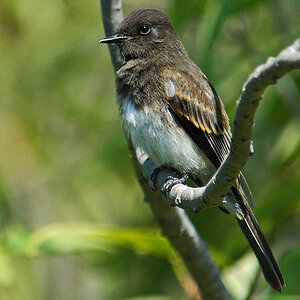
![[No title]](/data/xfmg/thumbnail/36/36675-f6965e1e6c1fa2be4ff0460e9657fe99.jpg?1619737676)


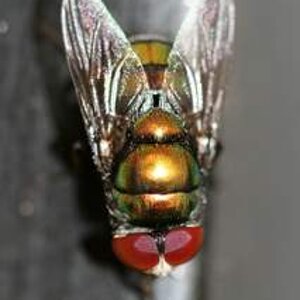
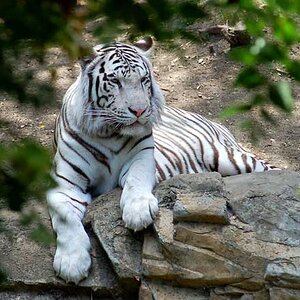
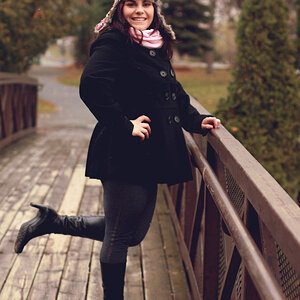

![[No title]](/data/xfmg/thumbnail/41/41799-fe172a668fba7717bf773664387d64aa.jpg?1619739897)
![[No title]](/data/xfmg/thumbnail/36/36677-3b91df53323d0850489794f28b3b9800.jpg?1619737677)
![[No title]](/data/xfmg/thumbnail/41/41796-690c109012575e084970902dbd3894ba.jpg?1619739896)
